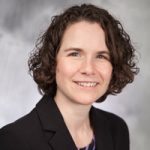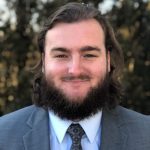Primary Investigator: Dr. Shanna Pearson-Merkowitz, Professor of Political Science (pictured at left)
In brief: Dr. Pearson’s Public Policy Lab team partnered with Adoption RI to conduct an analysis of state policies that aim to increase access to higher education for former foster youth. The team, which includes undergraduate students Austyn Ramsay (center), Shawn Sheppard (right), and Emma Mariano, analyzed current educational and economic outcomes among foster youth as well as the barriers to college entry and graduation. They also evaluated the current resources and aid available for foster youth in Rhode Island and investigated best practices from other states that could serve as models for Rhode Island.
SSIREP Fellows Propose Policies to Improve Educational Outcomes for Rhode Island’s Foster Youth
Thanks to a gift from a donor, URI’s Social Science Institute for Research, Education, and Policy (SSIREP) created the Public Policy Lab, where faculty and students partner with local governments and nonprofit organizations to improve community services and better the lives of Rhode Islanders through applied policy projects. Whereas students must often work low wage jobs to complete their education, this fund creates opportunities for them to conduct paid research fellowships under the mentorship of a faculty supervisor. At the Public Policy Lab, students apply their studies toward the development of graduate-level professional skills while working as part of a team to contribute meaningfully to their community.
At SSIREP’s Public Policy Lab, a project team partnered with Adoption Rhode Island to develop a set of policy proposals for improving higher education outcomes among foster youth in Rhode Island. The team was led by Dr. Shanna Pearson-Merkowitz (Department of Political Science), with BA students Austyn Ramsay, Shawn Sheppard, and Emma Mariano.
“Back in 2014, students in my Honors public policy class worked on a policy analysis for the state legislature on how to improve foster youth educational outcomes in [Rhode Island]. Several legislative changes were enacted at least in part due to those students’ research,” Dr. Pearson-Merkowitz said. “After that publication, Adoption Rhode Island reached out to SSIREP to see if we could be further involved. Through discussions, we identified that college access was a major issue facing foster youth in [Rhode Island].”
Dr. Pearson-Merkowitz’s team of students analyzed current educational and economic outcomes among the state’s foster youth, and the barriers to college entry and graduation they face. In order to produce their policy recommendations, they evaluated current resources and aid available for Rhode Island foster youth and investigated best practices implemented by other states.
For Austyn Ramsay, an outgoing senior in the Political Science Department who will begin law school in the fall, the project has provided valuable exposure to the professional world. “I was able to get firsthand experience working with agencies in the state of Rhode Island such as Adoption RI and the Department of Children, Youth, and Families, and work with a small group of students to develop a policy white paper that is ready for a professional client,” said Ramsay.
Shawn Sheppard observed that the project allowed him to practice skills in a meaningful applied context. “I have had the opportunity to hone my researching and writing skills,” said Sheppard, who is also an outgoing senior in the Political Science Department, “All while working collaboratively with fellow students and faculty to develop policies that will have a real impact on the Rhode Island community.”
Ramsay also noted skill-building facilitated by the fellowship. “I was able to develop… analytical, critical thinking, and research skills by being challenged by my peers and [Dr. Pearson-Merkowitz] on a daily basis, making me into a better student and professional,” she said.
For Sheppard, this challenge was invaluable. “I would highly recommend the fellowship to those interested in challenging themselves while expanding their research experience,” he said.
Dr. Pearson-Merkowitz hopes that collaboration with Adoption RI will continue, both within SSIREP and without. “We have many professors across campus who are experts in areas critically important to foster youth,” she said, “including mental and physical health care, family reunification, trauma, and education. I hope more students are able to work with Adoption Rhode Island by partnering with professors to help use science and analysis to inform public policy in this area.”



